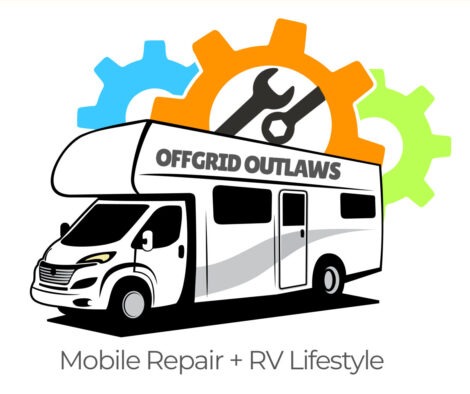Hey there full-time RV’ers and those of you curious about becoming full-time! There is one question I get quite a lot when it comes to being full timers, and that’s “How did we do this?”
I thought it would be great to take you through how we got here step by step.
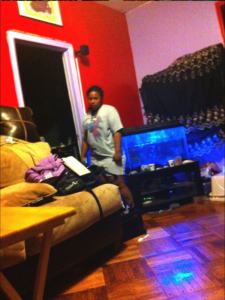
Let’s start with our decision to do this in the first place. In 2011, we were living in a tiny apartment in Brooklyn, NY. We were paying $1400/month for rent, $90/month for internet, $150/month for electricity, $100/month for parking, etc. So essentially, our household expenses came out close to $1700-$1800 a month (not including food, gas, or car insurance). We were only bringing in
$2000/month salary combined to support us both, so money was very tight.
We also traveled a lot for work. We spent a lot of time not at our apartment that was essentially utilizing our entire salary. When we were home, we liked to watch documentaries to decompress. We watched all of our TV online at that time with a portable projector attached to our Mac tower that I had leftover from 2001 while at college at the University of the Arts, and that was our TV. I guess we were ahead of the curve with that, as we had been doing it for years before sites like Netflix and Hulu came along. While browsing one night, we came across this documentary on YouTube, “American Nomads,” and saw people traveling full time in RV’s. April said that she thought we should do that, and at that point in our lives, I think it really struck a chord with us. We didn’t know how or when we would do it but started dreaming about really doing it.
About a year and a half later, in August of 2012, we lost our $100 a month parking space…which was sort of a big deal for us being that parking in Brooklyn can be expensive, and to add to it, we lived in a pretty sketchy part of Brooklyn. We often got home late at night, and that parking spot helped us feel a little more safe. We traveled enough (often by car) for work that we definitely needed our car. Within a month of that, we received a notice that our rent for our 400sq ft apartment would go up to $2200 a month in the next 12 months. So that made the decision easy for us to decide to move! We couldn’t afford to stay there. After several other “signs” from the universe appeared, we talked about it a little more, and decided this was the universe telling us that we should actually do it – we should become “American Nomads”!
The next part was how?
We already worked remotely, so that was not an issue thankfully. We had founded a music company that was partnered with a more prominent parent company that paid us our salary. The parent company was located in North Carolina, and we ran our business out of New York. Granted, we would be leaving some of our employees, clients, and business partners in New York with the move. However, the fact that we already worked remotely from home gave us the flexibility we needed to get started. We were lucky that we didn’t have a physical location we had to report to each day holding us back. We went to work in our office on the internet each day, and the internet was everywhere.
We later realized we had friends and family who we had not seen much of who strongly encouraged us to visit them all over the country. We decided to see if we could visit our way to saving enough to get started. The plan was…if we could avoid an apartment’s expense, we could really save up – we would just have to spend what we had already been spending on food. So, we scheduled visits for the next 12 months with friends and family, careful not to overstay our welcome at any one member’s place. We limited our visits to a maximum of 2 months at each location. Even if we were invited for longer, we chose not to stay. All the while, we were able to work remotely from wherever we were staying at the time. It really didn’t change much, other than not having to pay the expenses of having an apartment. We traveled for business ¾ of the time and made visits the other ¼ of our time. We could also leverage the business travel, which was typically paid for by clients requesting us to go to them for training or from our parent company needing us at a convention or event. We were able to leverage that to cover a lot of the costs from getting place to place. We ended up doing this for almost 2 years.
After 2 years, we saved nearly $20,000 on our $2000 a month combined salary! This was enough to get started in a brand-new RV and to buy a property in VA.
Was it ever a little uncomfortable? Of course! Who couch surfs for 2 years without having some awkward or unfortunate moments?
But was it totally worth it? Absolutely!!
If I had the chance, I would definitely do it over again to get to where we are now, no question! In fact, I would do it a lot sooner! I would have never had an apartment as an adult and moved right into an old junker van and saved up from the start if I could do it all again. It was one of the best decisions we have ever made.
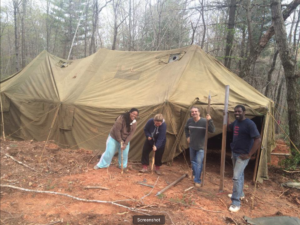
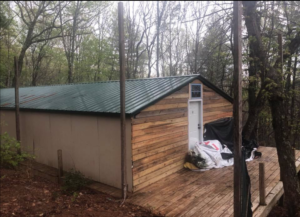
We had friends who had bought a very inexpensive property in Stuart, VA, so we started looking there. In 2014, we were able to find a 6-acre property for only $11,000. The property taxes on it were only $60/year at the time., making it very affordable for the long run. We bought this undeveloped, wooded property with cash from our savings.
That same year, we chose a brand-new $100,000 RV to avoid the issues of a run-down vehicle so we thought. That was a misguided notion! If I had a do over, we would NOT buy a brand-new RV. We would get a used RV instead that the previous owner had worked out all the kinks. ALL new RV’s come with kinks to work out. It would have been wiser to buy a used RV with lower monthly payments that had been well cared for by a previous owner. We did get some family help in getting the RV and cosigning for the loan – that was a huge break and a big part of allowing us to get started. In March 2014, we went to Lazydays in Florida, picked up our RV, and moved
into it full time.
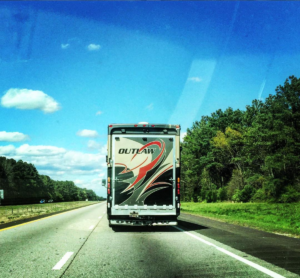
The monthly payments and insurance on our RV were the same as our rent and utilities in Brooklyn, which did work out nicely. However, we still needed to save more money to develop the property and make some off-grid and boondocking upgrades to the RV. So, we decided to live without a car for a while. We could travel to the work destinations we needed to visit in the RV; saving us on insurance, registration, and gas and making the RV our only significant expense. We sold the car and used the money from the sale to get a solar power system installed on the RV.
We boondocked for the first 4 years of owning the RV (thanks to the solar power installation that really made this possible). We stayed in Walmart Parking lots, Truck Stops, Borough of Land Management land, parked at homes of friends, parked in the parking lot of our parent company, stayed at Harvest Hosts ($40/year membership at the time), stayed at boondockers welcome homes (also $40/year membership at the time), boondocked on the streets of cities like Manhattan, Austin, and Los Angeles.
We would stay places a few months at a time to make this work. When we moved to another area (when traveling by choice), we would travel little bits each week to pay for the gas to travel within our weekly salary/budget. Sometimes, we would leverage business trips to get around. We would have the people requesting us for a training or the company we worked for cover our gas’s cost rather than pay for a flight and hotel. We literally didn’t pay for a place to park our RV for almost 350 days a year. We would check into an RV park occasionally here or there for a day or two to fill our water tank, dump our waste, and charge up our batteries to full. The solar and generator were terrific, but didn’t always give us the charge we needed to boondock fulltime. That literally only amounted to maybe 15 days a year in total. Hence, we spent very little on paying to “park”.
We also kept a YMCA gym membership, and we showered at the gym every day (and added bonus, it helped to keep us in shape), and there was a YMCA wherever happened to be at. Also to note, there are a TON of national gyms you can get a membership at to shower. At all truck stop chains, you can pay $10 -$15 to shower, and you can often even get a membership to shower for dirt cheap. Generally, both gym showers and, believe it or not, truck stop showers are very nice. They are a private, locking, individual bathroom with a shower. If you are traveling with someone else like us, it is o.k. to purchase one shower room for your group to share.

We really worked hard to save during those first two years. We had a blast doing things that were free and very inexpensive and focusing on work. We had a blast, and at the same time, spent very little. We were able to save enough to make a few upgrades to the RV (like purchasing a composting toilet which was a saving grace to not have to look for a place to dump our black tank so often anymore) and get a driveway cleared to park on while at our Virginia property. We also cleared some space for a military tent (for storage) on our land. We stored all of our stuff from our Brooklyn apartment in April’s mom’s basement for the first 2 years and the 2 years of “couch surfing” before that.
Once we could get some of our land cleared, we moved all of the belongings that we didn’t carry with us into storage in the military tent on our property. Things like our our furniture and other big stuff we kept there, as we had planned on building a permanent place at some point on our VA property. We wanted to use our belongings to furnish our home there, which we are still working on and almost done now. (Little by little, as we save up for each piece and build it with our own two hands when we can make the time).
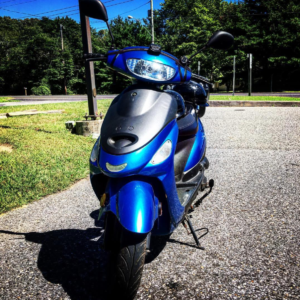
We bought a moped on year 2 of owning the RV. We realized that it was really limiting to have no vehicle at all. The cost of the moped was $500. It got 100mpg ($5 fill up) and didn’t require registration or insurance. It also costed very little to repair and maintain. It got us around each local area for the next 2 years. It also only went 30mph max, lol. It didn’t have much capacity to carry much. (Imagine carrying groceries home on a moped or picking a friend up from the airport with a big suitcase on a moped… these were things we actually literally did!). But we saved thousands of dollars on insurance, gas, registration, repairs, oil changes, etc. We were able to
utilize that money to make the RV and property more livable long term. During year 1 that we had the moped, we saved up enough to build a deck at our VA property to put the military tent (and all of our other belongings) on. We built the deck ourselves. The
cost for materials was $5000 (the deck was 60’ x 25’) and it kept the items we had in storage from getting ruined by the red clay and other weather elements. During year 2 that we had the moped, we saved enough to get a well installed on our VA property. This made it much more comfortable to stay there in the RV when we wanted or needed to. We also made minor improvements on the property on our own – buying the materials as we went along and could afford them (things like gravel for the driveway, landscaping a bit, mulch for the path.) It took us another 6 months to save enough to upgrade from a moped to a motorcycle.
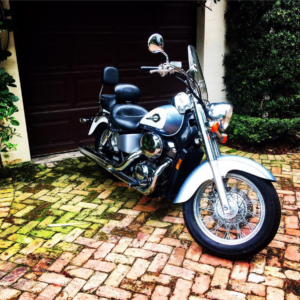
We bought an inexpensive, used motorcycle (under $2000, which the same bike .. same year, same model, similar mileage .. I am now seeing sell online for $4000, so…excellent investment). It only added $200 a year for insurance, and the gas was still around 100mpg, so it didn’t add on a lot of costs, but it did make things much more convenient for us. We did eventually get tired of boondocking after 4 years (I’ll tell you why in another post) and invested in a Thousand Trails membership (which is incredible, that is definitely for another article) which allows us to be in RV parks full time without paying for anything but the membership. Five years in, the RV was paid off, which allowed us to reduce the coverage we had on the vehicle. The RV being 5 years old also brought the insurance down.
We also had been trying to start a family. We took some more serious steps to do so (also fodder for a whole other article), which had us staying in one place for much longer. Because of our efforts to start a family, we eventually invested in a car (with payments). This sort of temporarily took away our ability to save. Still, we can afford the car payments because we do not have rent, mortgage, or utilities. If we were still paying rent or mortgage, we would not be able to afford car payments.
Over the past year, we have incurred debt, making some big moves to improve our property and lives. Still, in the meantime, we have created a TON of improvements to our property and our RV. We are almost at the finish line where we can most likely retire very early and just focus on having FUN. We just have to pay this car and other debt down over the next few years.
Ok, rather than going another 2 pages to get you caught up to today because you get the idea, I
will take a minute to highlight the essential footnotes.

1. Rent and Utilities are almost everyone’s most significant expenses; if you can find a way to eliminate these, even temporarily, it’s worth it! You can save enough to CHANGE YOUR LIFE!
Suppose you can manage to be temporarily uncomfortable for a year or two by NOT paying rent or utilities while maintaining your current income (even on a minimum wage salary). In that case, almost anyone can change their life. I understand if you have kids or take care of elderly or ill parents, this may not apply to you. However, if you are dependent-free, this CAN be your solution. If your job isn’t remote, and you can’t couch surf, I suggest selling your car (if you have one, assuming if you have a job, you probably do), using the money to buy a van (even if you have a car that is a junker you can buy an old, clunker, conversion van for $800 – $1000 that still runs and replace your car) and a thousand trails camping pass for about $500/year. You can shower, shit, shave, and work in the community amenities in the Thousand Trails parks, keep your current non-remote job, create a comfy living/sleeping space in your van, drive the van to and from work, and save up. You could even forget the Thousand Trails pass, boondock in the van (boondockers welcome, Harvest Host, street parking, Walmart parking lots), and pay for a gym membership to shower. Some might think this is crazy, but I think it’s crazy to keep living your life STUCK. Remember, the junker van is a TEMPORARY SOLUTION to solve what would otherwise be a LIFELONG PROBLEM. You can put away THOUSANDS of dollars in savings in just a year or two doing this.
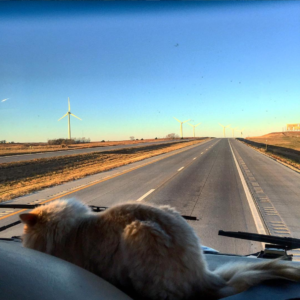
2. Remote work makes this whole thing a lot easier (but it’s not the only way to do this).
Over the past 20 years, remote work has become a tangible reality. Any job that heavily utilizes the phone and a computer can be done remotely. It’s often simply a CHOICE to have someone come into an office. Remote work actually saves both the employer and the employee quite a bit of money. The employer saves on overhead (office space, utilities, supplies, etc.). The employee saves on travel expenses to and from work, time to get ready, travel time, etc. So even for a non-traveling employee, there are quite a few benefits of remote work. In the past year, with the unfortunate challenge of Covid-19, many employers and employees have both
realized the full benefits (and some of the challenges) of remote work. Consequently, there are
more remote work opportunities than ever before.
Having a steady income while you travel is immensely helpful. It can mean the difference between allowing you to plan your travel, and having where you can make money determine when and for how long you can or have to visit a place. It does make areas with lousy internet or cell service a considerable challenge. It can give you a terrible day or week or even force you to literally move. People also don’t always understand that you actually work, when you work remotely, which often gives family or friends unrealistic expectations of your time. Navigating that can often be challenging (but again, it is totally and completely worth it). It isn’t bad to be somewhere unique and beautiful and only have an hour to enjoy it after work when that is your life full time, but don’t be mistaken. Living like this is far from a 24/7 vacation. It is being able to take a break in the middle of a workday and go for a 15-minute walk. Still, that walk is by somewhere beautiful with better weather than you would have where you lived in your apartment. You get to constantly be in a different place and see other things on that short walk.
Some days it means being in conference calls all day and then working to meet deadlines and then driving 3 or 4 hours in the evening to get to the next destination before doing it all again for the next few days until you reach the spot you are staying at for a month or two. It sometimes means listening to the people from the RVs around you have a great time on a beautiful day (because they are off on a short vacation) while you spend the day in your “mobile office” in your RV on your laptop. It sometimes means having your whole schedule thrown off because something big breaks in the RV (this happens in every RV no matter how much you “maintain” your RV, how well you plan, how new or well-kept your rig is, and this ALWAYS, as a rule, happens at the most inconvenient time for your work schedule.) Having to cancel meetings, move things around, drop everything, fix the problem, and then play catch-up. It might mean calling your more knowledgeable friend, scrounging up the money for some extra or new tools, and having someone walk you through a repair you have to figure out yourself. It might even mean working in the customer lounge of a service center for a few days while you sleep in your RV in their lot at night.
If you have a flexible work schedule, it might mean getting to take the day off and going on a hike with a friend who meets you somewhere for a few days but then working until 3 am that night. Or the reverse staying up to 2am with visiting friends only to get up at 7am to start working the next morning while your friends sleep in. It is completely awesome to have that flexibility, but do not be deceived into thinking it comes without its own challenges. Work camping (i.e., temporary employment that comes with an end date) and entrepreneurial endeavors (being self-employed) are other ways to be a full-time traveler while still requiring an income. It would require running a location-independent business. Retirees who have left the workforce have been full-time RV’ers for years. That is always another option. You could wait until you retire, (but I would recommend doing it NOW, you will have a blast when you are
young enough to enjoy it, it will set you up to retire early, and it will set you up to retire BETTER, it’s cheaper to live this way and makes your money go further). I will make sure to write another blog about all the options for making an income on the road and being able to afford to live. This particular blog was more about our story and how we did it.
Those are the two main things you will need to solve to get yourself started. Next time we can chat bout selecting a rig, planning your travels, and the minor nuisances you will need to figure out along the way. I hope you enjoyed our story of how we got started! Keep in touch with us by signing up for our newsletter or connecting with us over Instagram!
With all the love in the world-
Amanda and April
